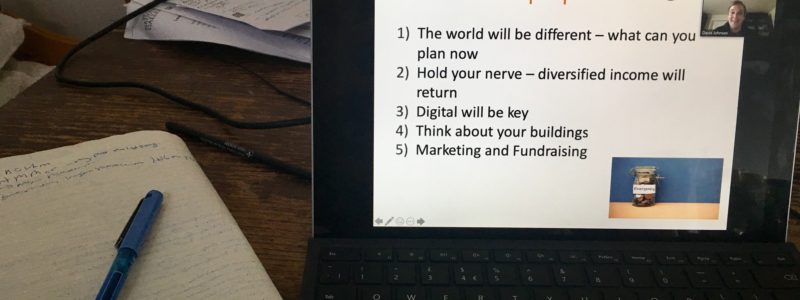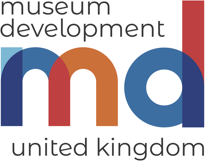London Museum Development: Training museums during Covid-19

Elizabeth Coningsby, Museum Development Officer, Training, reflects on how the London Museum Development team has adapted its training and development programme to support museums in lockdown.
London Museum Development manages the Skills Plus and Digital Futures training programmes for all paid and unpaid staff working for non-National (and non-NPO), Accredited museums in the London region, including furloughed staff. Both training programmes respond to the government’s 2017 Mendoza Review of the English Museum Sector, which called for greater emphasis on generic non-heritage skills such as business planning, management, income generation, marketing and digital.
Due to the Covid-19 outbreak, we have made significant changes to our planned training programmes for 2020-21. We have moved all our activities online and adapted the content of our sessions in response to the pandemic which saw the closure of all museums under lockdown. From April to July 2020, 223 delegates attended our courses and there have been almost 1500 views of our training videos. Although the majority have been from London’s smaller museums, where capacity allowed, we were able to accommodate more delegates from Nationals and other museums across the country and beyond! This is our story.
We had pretty much finalised the training programme for the Spring term, with our usual range of popular training sessions. First to go was a Skills Plus: Spectrum and Inventory session set to run on 1 April 2020 and due to be delivered by Sarah Brown from Collections Trust. Sarah and I sensed that our usual training delivery model just wouldn’t work in the weeks to come.
By mid-March, Italy, France and Spain were in Lockdown, the UK’s Covid-19 cases were increasing and people were avoiding Central London. Despite the world closing down around us, we decided to press on. We surveyed all delegates who had booked on courses to gauge the appetite for online training. The overwhelming response was “yes please!” This was a period of good will and sharing; trainers slashed their prices for us, the Museum of London shared their expertise and delegates were gracious with our early Zoom experimentations! We learnt things, listened to feedback and continued to refine the offer.
We had already booked some wonderful freelance trainers up to May 2020, so it was important to honour their contracts. However, we worked with contractors to tweak the content. For example, our Pitching and Negotiating session, delivered by Arts Fundraising and Philanthropy, turned into Crisis Fundraising. Agile in Museums felt more appropriate than ever and Managing Volunteers became Managing Volunteers Post Covid-19. We slipped in an extra Collaborating Remotely session and scrapped the rest of the programme to enable us to be more responsive in our programming. We commissioned sessions that focused on how to conduct museum life in the newly changed world including Planning to Reopen, Planning for Alternative Futures and much needed Digital training sessions.
In practical terms. we’ve worked out that the ideal online session is 2 – 2 ½ hours long with a decent break in the middle. Any more than that and delegates get screen fatigue. People like to see one another – especially the trainer, so unless bandwidth was a problem, we encourage people to turn their cameras on. For many, Lockdown has been a lonely experience and delegates are missing out on the usual networking opportunities.
I’ve learnt to manage this through making training sessions interactive through the use of polls, utilising the chat function and setting up facilitated breakout groups. Zoom’s breakout rooms are really great to use, but they must be facilitated. It’s easy for someone to dominate the conversation and for others to feel uncomfortable contributing within the new digital format.
We’ve used a range of trainers who have risen to the online delivery challenge. These are new skills. You need to be able to create engaging online content, establish rapport with the delegates, whilst making the session interactive. We experimented with several different online delivery platforms. We settled on Zoom, with its good functionality, including breakout rooms and use of polls. As part of a LMD team social, we even had a game of ‘Zoom Mafia’. It was great fun!
We’re now into the swing of things and have learnt so much. Through the Skills Plus and Digital Futures programmes last term, we managed to deliver 13 online training sessions. Through the expert mentoring of our Museum Development Officer, Digital and Communications, our team was trained in the new online ways of working early on, including learning new video editing and captioning skills. Though time consuming, this enables our training to be accessible to as many museums as possible.
In turn, we’ve harnessed the power of our brilliant team of volunteers and mentored them to help with bookings, video editing and captioning. We couldn’t have achieved all that we have without them. Team members have been able to cascade these new skills to our museums through targeted training, online coffee mornings focussing on particular digital skills needs and network meetings to develop partnerships online.
I have found online meetings with the Museum Trainers Network (MTN) and the Museum Development Network Training Group invaluable for sharing information. I’ve been able to offer others insight and support from our early training efforts. It’s been a time where everyone is navigating all these changes together. Meeting up more regularly with training colleagues across the Museum Development Network has been a super source of support. We’ve continued to share ideas, course content and trainers. In a strange way, I actually enjoyed the buzz of it all. Weekly team meetings and monthly Training Group meetings kept me going and it was actually a joy to be able to support London’s museums during this crisis.
For more information visit the London Museum Development website.
